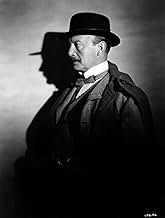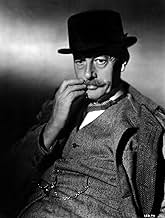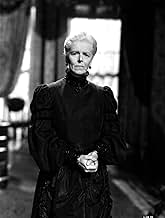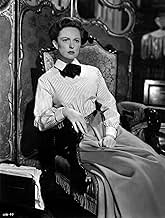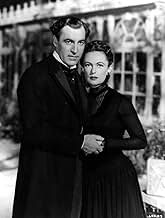AVALIAÇÃO DA IMDb
6,6/10
529
SUA AVALIAÇÃO
Uma mulher doente morre repentinamente, a autópsia revela uma dose fatal de arsênico. A suspeita cai sobre o marido e a companheira, que são amantes. O inspetor Martin, resolve o mistério, t... Ler tudoUma mulher doente morre repentinamente, a autópsia revela uma dose fatal de arsênico. A suspeita cai sobre o marido e a companheira, que são amantes. O inspetor Martin, resolve o mistério, tomando uma chávena chá.Uma mulher doente morre repentinamente, a autópsia revela uma dose fatal de arsênico. A suspeita cai sobre o marido e a companheira, que são amantes. O inspetor Martin, resolve o mistério, tomando uma chávena chá.
- Direção
- Roteiristas
- Artistas
Irene Arnaud
- Horace's wife
- (não creditado)
Frederick Kelsey
- Mr. Chudleigh
- (não creditado)
Ernest Metcalfe
- Cabbie
- (não creditado)
Sidney Monckton
- Horace
- (não creditado)
Avaliações em destaque
"The Late Edwina Black" from 1951 stars Geraldine Fitzgerald, a favorite of mine, and David Farrar.
The story takes place in Victorian England. Gregory, Edwina Black's husband, is a schoolteacher. Edwina herself seems to be an invalid and independently wealthy. Her companion from childhood is Ellen (Jean Cadell).
The other person helping with Mrs. Black is Elizabeth. Elizabeth happens to be in love with Gregory, and he with her, and Ellen knows it.
One day Mrs. Black is found dead, and while at first it seems like a heart attack, it appears she was poisoned. A police inspector (Roland Culver) comes around as soon as it is learned how Mrs. Black died. His questions annoy Gregory and upset Edwina.
Before you know it, the two of them are suspecting one another. Elizabeth believes Edwina's spirit is still present and trying to destroy both of them.
Good movie, good mystery, with fine acting. It really does keep you wondering. The atmosphere is terrific, mostly inside a big, dark, gloomy house, which is perfect for the plot.
David Farrar was quite handsome but, like Dirk Bogarde before him, just wasn't cut out for Hollywood. While Bogarde's career in Europe continued and expanded after Hollywood, Farrar could not regain his momentum. He finally retired. Recommended.
The story takes place in Victorian England. Gregory, Edwina Black's husband, is a schoolteacher. Edwina herself seems to be an invalid and independently wealthy. Her companion from childhood is Ellen (Jean Cadell).
The other person helping with Mrs. Black is Elizabeth. Elizabeth happens to be in love with Gregory, and he with her, and Ellen knows it.
One day Mrs. Black is found dead, and while at first it seems like a heart attack, it appears she was poisoned. A police inspector (Roland Culver) comes around as soon as it is learned how Mrs. Black died. His questions annoy Gregory and upset Edwina.
Before you know it, the two of them are suspecting one another. Elizabeth believes Edwina's spirit is still present and trying to destroy both of them.
Good movie, good mystery, with fine acting. It really does keep you wondering. The atmosphere is terrific, mostly inside a big, dark, gloomy house, which is perfect for the plot.
David Farrar was quite handsome but, like Dirk Bogarde before him, just wasn't cut out for Hollywood. While Bogarde's career in Europe continued and expanded after Hollywood, Farrar could not regain his momentum. He finally retired. Recommended.
Edwina Black has died and an autopsy shows she was poisoned with arsenic. Meanwhile, her widower and his secretary (played by the wonderful Geraldine Fitzgerald), who have been waiting for her to die, are preparing to go off to the Continent. While the police inspector (played slowly and perfectly by Roland Culver) investigates, they turn on each other in private. Who poisoned Edwina Black? Who is lying?
Maurice Elvey, one of the great forgotten talents of the British film industry, directs this as an Old Dark House mystery, where the spirit of the late Edwina Black is evinced by the low light levels and the occasional tinkling of a crystal chandelier. His use of camera movement is almost undetectable unless you look for it -- it serves merely to maintain composition. Elvey was among the most subtle of directors in the British industry -- he did what he did in support of the movie, lacked any of the immodesty that the auteur-loving writers of the CAHIERS DE CINEMA adored and made an excellent movie in the process. Take a look at this one and see.
Maurice Elvey, one of the great forgotten talents of the British film industry, directs this as an Old Dark House mystery, where the spirit of the late Edwina Black is evinced by the low light levels and the occasional tinkling of a crystal chandelier. His use of camera movement is almost undetectable unless you look for it -- it serves merely to maintain composition. Elvey was among the most subtle of directors in the British industry -- he did what he did in support of the movie, lacked any of the immodesty that the auteur-loving writers of the CAHIERS DE CINEMA adored and made an excellent movie in the process. Take a look at this one and see.
This is a fine thriller well acted and directed.Jean Cadell does a fine job of scaring the life out of everyone.Veteran director Maurice Elvey does a fine job of sustaining suspense despite the fact that there are only three suspects.Roland Culver is the diligent detective who bit by bit manages to deduce what happened and whodunnit.The ending is a bit of a surprise.
The Obsessed is a nice example of English noir and of the murder mysteries they do so well and with such style. It's a wonderful case study on how suspicious minds can mess with your head.
Schoolmaster David Farrar's wife who's a rich sickly soul is given arsenic poisoning and that brings Scotland Yard in with Inspector Roland Culver. Farrar has been carrying on for some time with Geraldine Fitzgerald who is the wife's companion.
The bulk of the film is spent with Farrar and Fitzgerald each thinking the other did it and trying to keep their relationship intact. Housekeeper Jean Cadell, a nasty old soul is sure it was one of both.
A whole lot of emotions come into play with the scenes of the two leads often at the same time, hope, fear, anger, suspicion all fueled by the wife's poisoning.
As is usual the wise Scotland Yard inspector with some forensic help sorts it all out.
Great acting especially from the two leads.
Schoolmaster David Farrar's wife who's a rich sickly soul is given arsenic poisoning and that brings Scotland Yard in with Inspector Roland Culver. Farrar has been carrying on for some time with Geraldine Fitzgerald who is the wife's companion.
The bulk of the film is spent with Farrar and Fitzgerald each thinking the other did it and trying to keep their relationship intact. Housekeeper Jean Cadell, a nasty old soul is sure it was one of both.
A whole lot of emotions come into play with the scenes of the two leads often at the same time, hope, fear, anger, suspicion all fueled by the wife's poisoning.
As is usual the wise Scotland Yard inspector with some forensic help sorts it all out.
Great acting especially from the two leads.
The Late Edwina Black is directed by Maurice Elvey and adapted to screenplay by Charles Frank and David Evans from the play of the same name by William Dinner and William Morum. It stars David Farrar, Geraldine Fitzgerald, Roland Culver and Jean Cadell. Music is by Allan Gray and cinematography by Stephen Dade.
It's Victorian England and Edwina Black has just died. When a fatal dosage of arsenic is revealed to be the cause of death, suspicion falls on Edwina's husband Gregory (Farrar) and her house companion Elizabeth (Fitzgerald). More so when it becomes apparent that Gregory and Elizabeth are having a passionate love affair. Intrepid Inspector Martin (Culver) investigates as housekeeper Ellen (Cadell) looks on with interest from the shadows.
Under seen Brit period mystery resplendent with moody melodramatics and some spooky shenanigans. This is all about a mystery to be solved in a big Victorian house bathed in shadows and low lights. There is only three suspects, so for those paying attention from the off the mystery is a little weak, while there's some over acting indicative of the time.
However, Elvey and Dade prove very adept at creating a house of ominous atmosphere, where although the hinted at supernatural elements are not in the realm of horror, they work well in context of the back drop. Characterisations are nicely drawn, especially when the harmony of Gregory and Elizabeth's affair begins to crack.
It all builds to a quintessentially olde British finale, as the great Roland Culver gets to do his Hercule Poirot act, all neatly revealed over a cup of tea! Hooray! 7/10
It's Victorian England and Edwina Black has just died. When a fatal dosage of arsenic is revealed to be the cause of death, suspicion falls on Edwina's husband Gregory (Farrar) and her house companion Elizabeth (Fitzgerald). More so when it becomes apparent that Gregory and Elizabeth are having a passionate love affair. Intrepid Inspector Martin (Culver) investigates as housekeeper Ellen (Cadell) looks on with interest from the shadows.
Under seen Brit period mystery resplendent with moody melodramatics and some spooky shenanigans. This is all about a mystery to be solved in a big Victorian house bathed in shadows and low lights. There is only three suspects, so for those paying attention from the off the mystery is a little weak, while there's some over acting indicative of the time.
However, Elvey and Dade prove very adept at creating a house of ominous atmosphere, where although the hinted at supernatural elements are not in the realm of horror, they work well in context of the back drop. Characterisations are nicely drawn, especially when the harmony of Gregory and Elizabeth's affair begins to crack.
It all builds to a quintessentially olde British finale, as the great Roland Culver gets to do his Hercule Poirot act, all neatly revealed over a cup of tea! Hooray! 7/10
Você sabia?
- CuriosidadesAfter opening in England in 1949, the original play had a short-lived run at the Booth Theatre, New York, starring Signe Hasso from November 21 to December 2 1950.
- Erros de gravaçãoGregory and Elizabeth get carried the way by the thought of a splendid dinner. They lay the dining-room table using fine cutlery, china and glassware, and change into formal clothes. However, there is no-one to cook the meal for them and they do nothing to prepare it themselves.
- ConexõesVersion of Matinee Theater: Edwina Black (1956)
Principais escolhas
Faça login para avaliar e ver a lista de recomendações personalizadas
- How long is Obsessed?Fornecido pela Alexa
Detalhes
- Data de lançamento
- País de origem
- Idioma
- Também conhecido como
- Obsessed
- Locações de filme
- Worton Hall, Isleworth, Middlesex, Inglaterra, Reino Unido(House exteriors)
- Empresas de produção
- Consulte mais créditos da empresa na IMDbPro
- Tempo de duração
- 1 h 18 min(78 min)
- Cor
- Proporção
- 1.37 : 1
Contribua para esta página
Sugerir uma alteração ou adicionar conteúdo ausente

